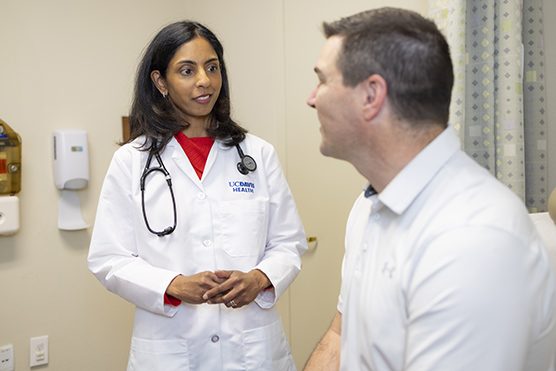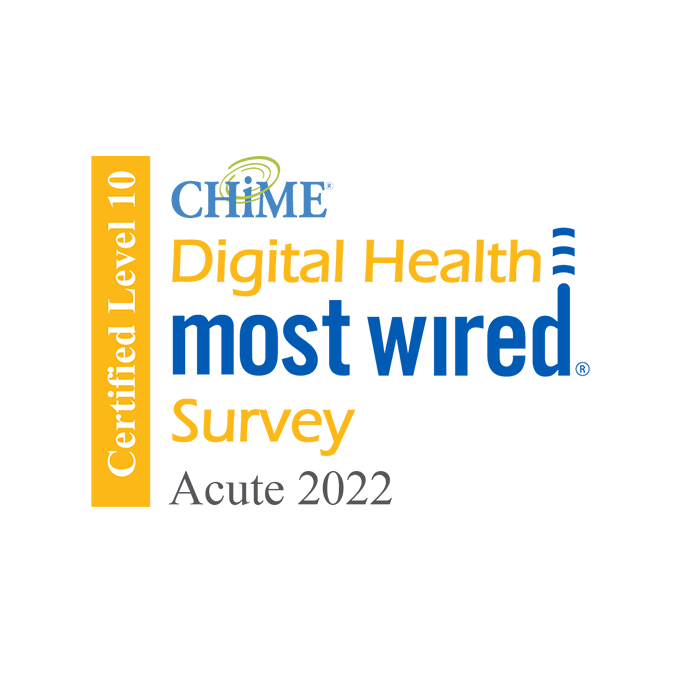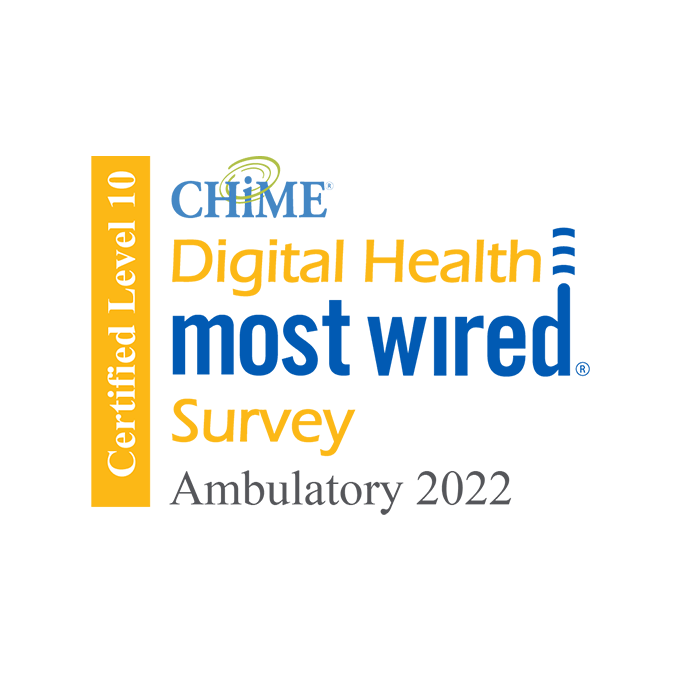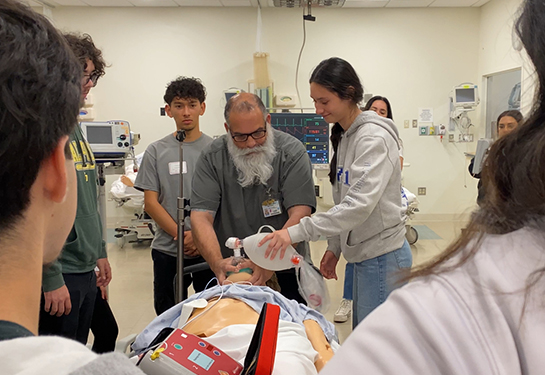Chronic Kidney Disease (CKD)
We offer a full range of services to manage chronic kidney disease (CKD) and slow disease progression. You could benefit from medications, educational programs and more.
Medically reviewed on Sep. 05, 2023.

Personalized Care for CKD
Kidney specialists (nephrologists) at the UC Davis Division of Nephrology offer advanced care for CKD. Our team monitors the health of your kidneys, providing the latest treatments to slow disease progression and lower your risk of kidney failure.
What is Chronic Kidney Disease?
Chronic kidney disease (CKD) occurs when something damages both of your kidneys. This damage affects how well your kidneys remove waste and fluids from your blood.
CKD is a chronic (long-term) condition that gets worse over time. There are five stages of chronic kidney disease:
- Stage 1: Mild, early-stage kidney damage with almost normal kidney function
- Stage 2: Early-stage kidney damage with mild decrease in function
- Stage 3a: Mild to moderate loss of kidney function
- Stage 3b: Moderate to severe loss of kidney function
- Stage 4: Severe damage and barely functioning kidneys
- Stage 5: Most severe damage (kidney failure)
If chronic kidney disease progresses to kidney failure, you’ll need dialysis to do the work of your kidneys or a kidney transplant. Kidney failure is also called end-stage renal disease (ESRD).
Chronic Kidney Disease Symptoms
An estimated 9 in 10 people with early-stage kidney disease don’t know they have it because they don’t have symptoms. Symptoms become more noticeable when your kidneys start to fail.
Common Symptoms
Signs of chronic kidney disease may occur gradually, over several years, making the disease difficult to detect. These signs include:
- Changes in urination, including foamy urine
- Fatigue
- Itchy skin
- Loss of appetite and unintended weight loss
- Sleep problems
- Shortness of breath
- Swollen feet, ankles or legs
Emergency Symptoms
Stage 5 kidney disease (kidney failure) is a medical emergency. Watch for these symptoms:
- Changes in skin color
- Leg cramps
- Lower back pain
- Nausea and vomiting
- Severe headaches or confusion
- Unexplained weight loss
Causes of Chronic Kidney Disease
Conditions that damage your kidneys lead to chronic kidney disease.
Diabetes
Diabetes occurs when your blood sugar is too high. Both type 1 diabetes and type 2 diabetes can affect your kidneys.
High Blood Pressure (Hypertension)
High blood pressure weakens the blood vessels that carry blood to and from your kidneys.
Risk Factors for Chronic Kidney Disease (CKD)
Your chances of developing chronic kidney disease are higher if you have one or more of these risk factors.
Age
Chronic kidney disease becomes more common as you get older.
Autoimmune Diseases
Having an autoimmune disease, such as lupus, increases your risk.
Family History of Kidney Disease
You’re more likely to develop chronic kidney disease if a close family member has it.
Heart Disease
Heart disease and chronic kidney disease often occur together. One condition may lead to the other.
Obesity
Excess weight can lead to diabetes and high blood pressure, which cause kidney damage.
Race and Ethnicity
People who are Black, Hispanic, Latino, Native American and Asian American are more prone to kidney disease brought on by diabetes or high blood pressure.
Smoking
The use of tobacco products can raise your blood pressure, contributing to chronic kidney disease.
Diagnosing Chronic Kidney Disease
Early detection of chronic kidney disease (CKD) is key to slowing the disease and preventing kidney failure.
If you’re at risk for CKD, or already have it, our kidney specialists may use these tests to monitor the health of your kidneys:
- Creatinine test: A blood test measures creatinine levels in your blood. This waste product builds up when you have kidney disease.
- Estimated glomerular filtration rate (eGFR): This blood test measures how well your kidneys filter impurities from your blood.
- Imaging tests: An ultrasound, CT scan or MRI can provide images of your kidneys, including blood flow.
- Urine tests: A urine test checks for blood and protein in your urine, which are signs of kidney disease.
Chronic Kidney Disease Treatments
At UC Davis Health, you receive advanced kidney care from a team of doctors, nurses and case managers who specialize in chronic kidney disease. We offer a full spectrum of services and treatments from medication management to kidney transplantation.
Case Management
Our CKD case management team provides coordinated care and education to help you manage kidney disease.
Health Education
We offer online and in-person health education classes. These help you manage conditions that cause kidney disease, like diabetes and high blood pressure. We also have Caring for Your Kidneys classes.
Medication Management
Diabetes and blood pressure medicines can slow kidney damage. However, in most cases there aren’t medications that specifically treat chronic kidney disease.
Nutrition Counseling
Registered dietitians in our Food and Nutrition Services help you make dietary changes that protect your kidneys. For instance, you may need to cut back on sodium or potassium.
Dialysis
Dialysis does the job of your kidneys when your kidneys fail. We offer specialized care for people who need this treatment.
Kidney Transplant
The UC Davis Health Transplant Center is a national leader in kidney transplants. We transplant kidneys from living and deceased donors, which improves your chances of getting a kidney.
Preventing Chronic Kidney Disease
You can’t change certain kidney disease risk factors, such as your age or race. However, these steps can protect the health of your kidneys:
Eat Healthy
Your provider may recommend a low-sodium, low-fat diet with lots of fresh vegetables and fruits. Cutting back on sugar can help prevent excess weight gain and diabetes.
Follow Medication Instructions
Your provider may prescribe you medications to manage high blood pressure and diabetes. Treating these health issues can reduce the damage they cause your kidneys.
Limit Alcohol
Limit alcoholic drinks to one per day for women or two per day for men. For people over age 65, limit to no more than one alcoholic beverage per day.
Stop Smoking
Connect with experts in our Stop Tobacco Program (SToP) for help giving up tobacco products.
"Kidney Disease Statistics for the United States," NIH: National Institute of Diabetes and Digestive and Kidney Diseases, https://www.niddk.nih.gov/health-information/health-statistics/kidney-disease
Who does chronic kidney disease affect?
1 in 7Americans have CKD
As many as
9 in 10People with CKD don’t know they have it
Source: National Institute of Diabetes and Digestive and Kidney Diseases: Kidney Disease Statistics for the United States
Request an Appointment
As Sacramento's No. 1 hospital, you'll benefit from unique advantages in primary care and specialty care. This includes prevention, diagnosis and treatment options from experts in 150 specialties.
Referring Physicians
To refer a patient, you can submit an electronic referral form or call.
800-4-UCDAVIS
Patients
For questions and appointment information
Consumer Resource Center
800-2-UCDAVIS

Ranked among the nation’s best hospitals
A U.S. News & World Report best hospital in cancer, cardiology, heart & vascular surgery, diabetes & endocrinology, ENT, geriatrics, neurology & neurosurgery, obstetrics & gynecology, and pulmonology & lung surgery.

Ranked among the nation’s best children’s hospitals
A U.S. News & World Report best children’s hospital in diabetes & endocrinology, nephrology, and orthopedics*. (*Together with Shriners Children’s)

Ranked Sacramento’s #1 hospital
Ranked Sacramento’s #1 hospital by U.S. News, and high-performing in COPD, colon cancer surgery, diabetes, heart attack, heart failure, hip fracture, hip replacement, kidney failure, leukemia, lymphoma & myeloma, lung cancer surgery, ovarian cancer surgery, pneumonia, prostate cancer surgery, stroke, TAVR, uterine cancer surgery, gastroenterology & GI surgery, and orthopedics.

The nation’s highest nursing honor
UC Davis Medical Center has received Magnet® recognition, the nation’s highest honor for nursing excellence.

“Most Wired” for acute care
UC Davis Health has been recognized as a level 10 out of 10 in the Digital Health “Most Wired” program from the College of Healthcare Information Management Executives (CHIME). The honor recognizes excellence in using technology to improve the delivery of care.

“Most Wired” for ambulatory care
UC Davis Health has been recognized as a level 10 out of 10 in the Digital Health “Most Wired” program from the College of Healthcare Information Management Executives (CHIME). The honor recognizes excellence in using technology to improve the delivery of care.

World-class cancer care
One of ~56 U.S. cancer centers designated “comprehensive” by the National Cancer Institute.

A leader in health care equality
For the 11th consecutive year, UC Davis Medical Center has been recognized as a “Leader in LGBTQ+ Healthcare Equality.”

